AudioCulture
The noisy library of New Zealand music
Te pātaka korihi o ngā puoro o Aotearoa
Weta
Weta frontman Aaron Tokona proved he had rock and roll flowing through his veins from a young age. The budding guitarist was expelled from Lower Hutt’s Taita College after taking the reins of a classical piece in school assembly to perform his own version of Van Halen’s ‘Eruption’.
His younger brother Clinton Tokona (better known as Tookie) recalls his older brother’s enthusiasm for the guitar from a young age.
"I used to live with that fella in my room when I was young. When he was 16 he used to play guitar from 6 in the evening until 6 in the morning, have an hour's sleep, and get up and go to school,” he told NZ Herald’s Russell Baillie in September 2000.
Moving on to the Hutt Valley’s Naenae College, Aaron joined the band Pride and Joy as lead guitarist, allowing him to show off his prowess and a passion for shred guitar. He went on to win the Best Musician prize at a national Rockquest competition, covering his idol Joe Satriani's ‘Surfing With The Alien’.
The competition gave Aaron more than just a certificate. It was there that he linked up with drummer Clinton den Heyer. Together, with former Hustler guitarist Gabriel Atkinson and Aaron’s bass playing brother Tookie, they formed Weta in 1995, taking their name from the large native New Zealand insect.
Aaron took on the role as the main songwriter, developing ideas in his bedroom before taking them to the band.
Aaron took on the role as the main songwriter, developing ideas in his bedroom before taking them to the band for further experimentation.
With their energetic brand of rock, the band developed a solid live reputation around their hometown. The track ‘Calling On’ was featured on the 1997 Wellington compilation Infocity Overground: A Fine Assortment of Wellington Rock Music.
Their growing profile gained them a support slot for US alt-rock band Everclear at the James Cabaret in Wellington in 1996. Further support slots soon followed. A high point for the band came after being selected to warm up the crowd for Seattle rock band Soundgarden. Having become frustrated with technical issues on stage at the Wellington Town Hall show, Soundgarden bassist Ben Shepherd gave his brand new bass to Tookie. It was unfortunately later stolen out of a van in Auckland.
The band forged gigging relationships with local likeminded groups, including Head Like A Hole and Shihad, who became mentors. An early version of the infectious single ‘Got The Ju’ first appeared as a shared B-side to Shihad’s single, ‘Yr Head Is A Rock’, along with tracks from fellow Wellington rock groups Hell Is Other People, Letterbox Lambs and Short.
The relationship progressed as Weta drew on Shihad drummer Tom Larkin to produce their debut EP Natural Compression at Wellington’s Marmalade Studios in 1998. They also gained assistance from Wildside Records founder Murray Cammick who facilitated two successful NZ On Air funding applications for ‘Where Have You Been’ and ‘Let It Go’.
The four-song EP was released in August 1999 and reached No.12 on the NZ Singles Chart.
With the encouragement of Shihad’s Australian management, the four-song EP was released in August 1999 and reached No.12 on the NZ Singles Chart. It sold around 5,000 copies in Australia.
The original planned artwork on the sleeve of the EP, taken by New Zealand photographer Jono Rotman, was apparently pulled due to its graphic nature. The images showed a scantily clad woman and a man wearing pink nappies, tied to a bed frame.
In 1997, Aaron Tokona temporarily filled in on guitar for Australian band The Superjesus after original guitarist Chris Tennent left the band. Although he declined a permanent position to focus on Weta, The Superjesus manager Dan Hennessy took an interest in the band. On taking the position as A&R chief at Warner Music Australia, and upon recommendation from Shihad’s Tom Larkin, Hennessy swiftly added Weta to their roster. “It’s so refreshing to meet people who are willing to work hard and who have no ego,” Hennessy told NZ Musician (June/July 2000).
Management of the band was passed on to Hennessy’s colleague Steven Betts at Aloha Management.
With the label and management by their side, the band followed in the footsteps of Shihad and made the move to Melbourne. They even found themselves house sitting for the band while they were away in Canada recording The General Electric.
"We deliberated about it for a long time and we thought at the very least we should give it a go. Shihad had paved the way over there and at least we were going over to some people that we knew. Also it was this opportunity to better the music, to better the band.” (Clinton den Heyer, NZ Herald, September 2000)
Within eight weeks of being in Melbourne, Weta found themselves on a local tour circuit playing 40 dates around the country. Unfortunately they were delegated to playing the early slot, just as families were sitting down to enjoy their dinner. Adapting to the situation, they introduced middle-of-the-road covers into their set.
As the momentum built and with support from Warner, the band evolved from a project to a full time job. They undertook further national tours in support of the Natural Compression EP and eventually a six-date tour with US rock band Filter. The touring continued through 1999 and 2000 with the band making several trips back and forth across the ditch for support slots, including Australian bands Regurgitator, Silverchair, The Living End and Powderfinger, for whom Aaron provided guest vocals for the album Odyssey Number 5.
Armed with around 15 songs, the band set up in Melbourne’s Sing Sing Studios to record their debut album.
Armed with around 15 songs, the band set up in Melbourne’s Sing Sing Studios to record their debut album at the turn of the century. Shopping around for producers, they recorded a demo of ‘So Far So Close’ with US producer and engineer Jonathan Burnside. The track saw a soft release on the Homegrown compilation given away by music retailer Sounds. It also became a regular acoustic track in the band’s set.
With no immediate connection with Burnside, and a preference for analogue recording techniques, the band sought out different collaborators.
“We were trying out this American producer and it wasn’t really our vibe. He used quite a lot of technology and stuff like that.” (Aaron Tokona, NZ Musician June/July 2000)
The band eventually enlisted Englishman Steve James, a former collaborator with The Sex Pistols and The Clash, who was chosen for his ability to capture the all important element of “vibe”.
“Steve James kind of brought it all back to being organic. He stripped a lot of the songs down to the bare bones and then we kind of dressed them up from the start again. Some of them turned out in a way we didn’t expect them to turn out… it was all for the good.” (Aaron Tokona, NZ Musician June/July 2000)
James opted to record onto analogue two-inch tape over digital methods and proved a fan of capturing songs in their first takes.
“His method of working was like, ‘What do you reckon, you want a guitar sound? Well you take the mic, you put it there, and then you turn the fucking thing up really fucking loud, and then you push record!’ He wasn’t the kind of guy to arse around too much. It was real straight up the guts and I think that’s a very English thing. We usually warm up into the track, especially for guitar takes and stuff – Gabes and I can be quite anal – but he was like ‘Yep, great, next! Yep, great, next!’ and he was really going after the first take for everything. That took a while to get used to. He was like giving us one, two, three chances, and that was it. It gave everything much more of an edge as opposed to sitting there and being to anal.” (Aaron Tokona, NZ Musician June/July 2000)
The recording was mixed by Dave Baskin at Sing Sing before being sent to the UK for mastering.
Geographica was released on September 15, 2000 and debuted at No.8 on the New Zealand charts.
Geographica was released on September 15, 2000 and debuted at No.8 on the New Zealand charts. The album was distinctly more dynamic than its four-song predecessor, combining the band’s signature driving rock edge with atmospheric melodies. The NZ Herald’s Russell Baillie called it the “best local release of the year”. It subsequently gained platinum certification and earned the band Most Promising Band and Most Promising Vocalist at the 2000 New Zealand Music Awards.
Eleven tracks made it on to the record including re-recordings of ‘Let It Go’ and ‘Got The Ju’ from the Natural Compression EP. Non-album tracks ‘Egg’ and ‘Time’ were used as B-side tracks on the lead single ‘Calling On’ which received significant airplay on Australian radio station Triple J. ‘Snapshot’ and ‘If I Will I Can’ were also released as radio-only singles after the album's release.
Two months after the release of Geographica the band set out on a highly anticipated tour of New Zealand alongside Shihad and Fur Patrol, although the group had already discussed (at a fish and chip shop in New Plymouth) that it would be their last appearance as a band.
Weta’s final show was at the Nelson Trafalgar Centre on November 25, 2000.
As the rumour mill began to spin, the band cancelled their scheduled appearance at the 2001 Big Day Out. Band manager Steve Betts told Real Groove magazine (December 2000), "Officially, Weta have taken a two month break after two and a half years of hectic touring and recording schedules abroad." The band's future remains unclear … " The break would prove to be much longer than initially reported.
Despite being an Australian-recorded and funded debut album, Geographica was only released in New Zealand. Following the split, its scheduled release in February 2001 was scrapped and the wound was deep for Warner Music Australia, having invested between $300,000 and $400,000 on the band.
Warner A&R manager Dan Hennessy said there were no plans to release the album in Australia without a band to tour it: "It's disappointing because it's such a great record and they had such great potential but bands break up all the time in this industry."
Aaron put the band's break-up down to the demands of touring and the expectations of signing to an Australian record label.
"We stumbled into it and all of a sudden we were a signed act. I think we just basically wore ourselves out. We had a certain amount of pressure and I didn't think the touring would get to us, because it was always a great way to have a holiday, but it became a kind of monster. "It went from being this thing you love to something arduous,” Aaron told Scott Kara in the NZ Herald (January 2009).
In the interim Aaron started a family and made a guest appearance on 'Dark Days' by Fat Freddy’s Drop. Gabriel and Tookie moved back to Melbourne and started a band called The Hot Rods, and Clinton den Heyer worked with alt-rock band Marystaple on their debut EP Reset Speed before purchasing Wellington bar Good Luck and venue San Francisco Bath House with Tim Ward.
After an eight-year break, the band were announced as a replacement act for US metal band Testament at Southern Amp Festival in Christchurch on November 9, 2008. The show was followed by a three-date reunion tour through Auckland, Wellington and Christchurch, as well as later appearances at the Big Day Out and Homegrown festivals.
Warner Music re-released Geographica in New Zealand to coincide with the tour and the band debuted one new live song over the course of the reunion shows. A second album was also suggested though it never eventuated and the band went their separate ways again.
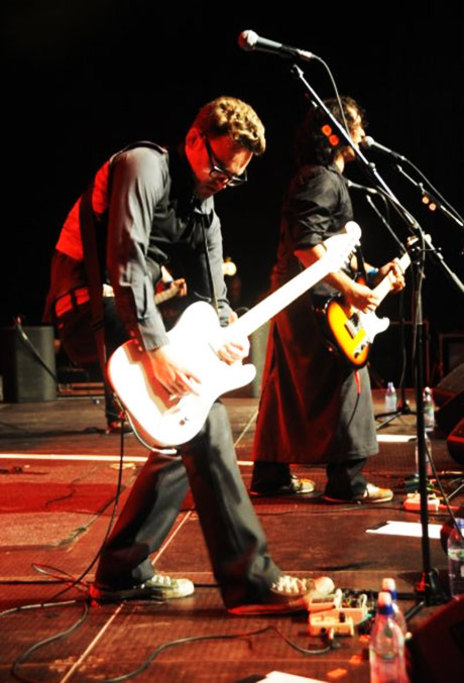
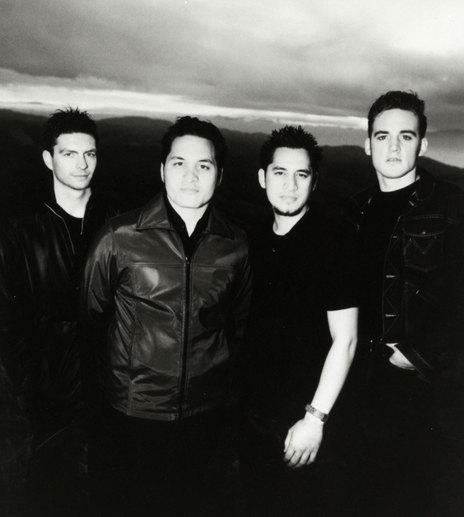
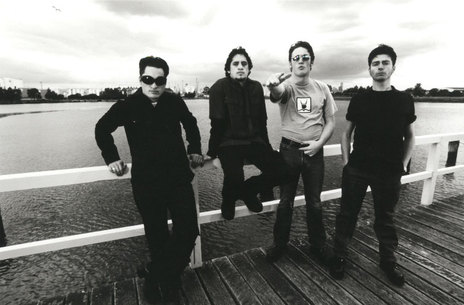
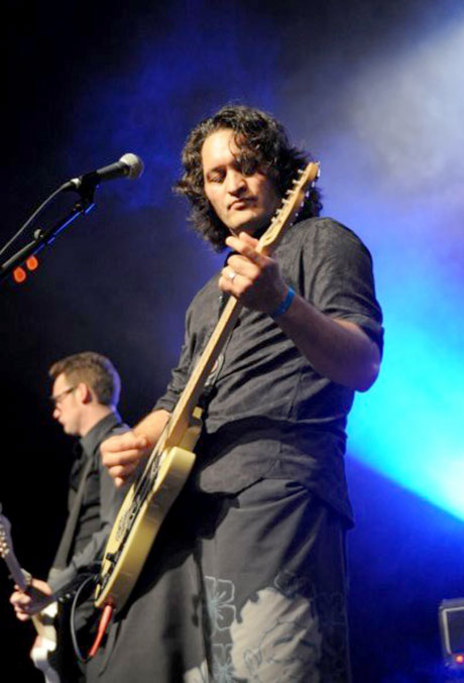
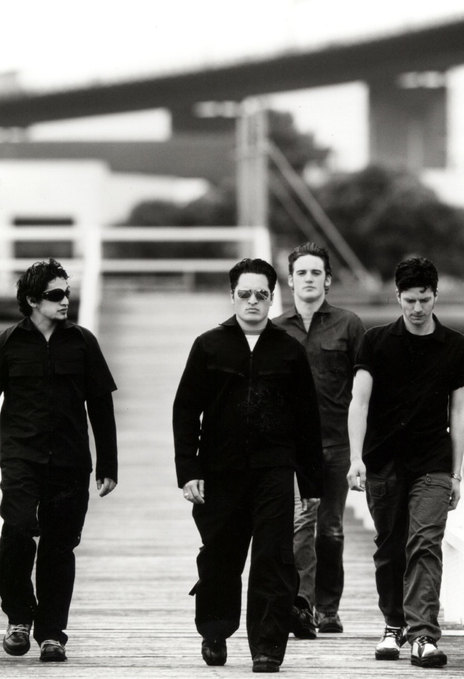
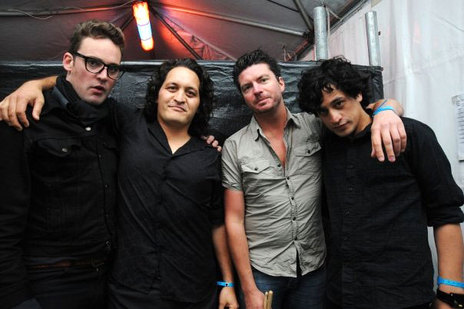
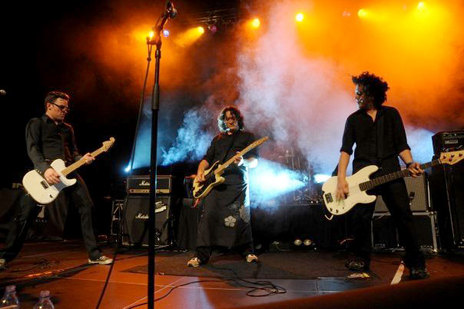
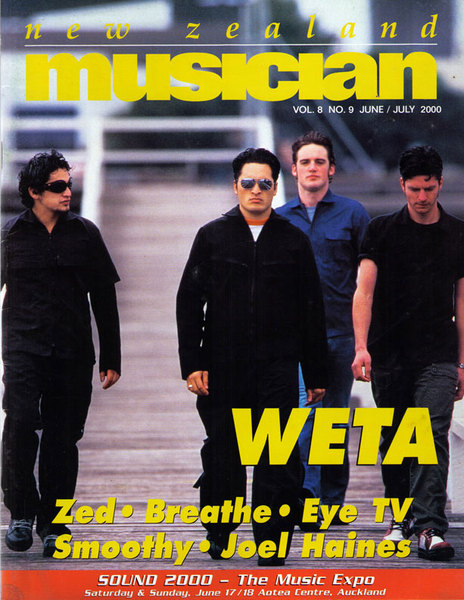
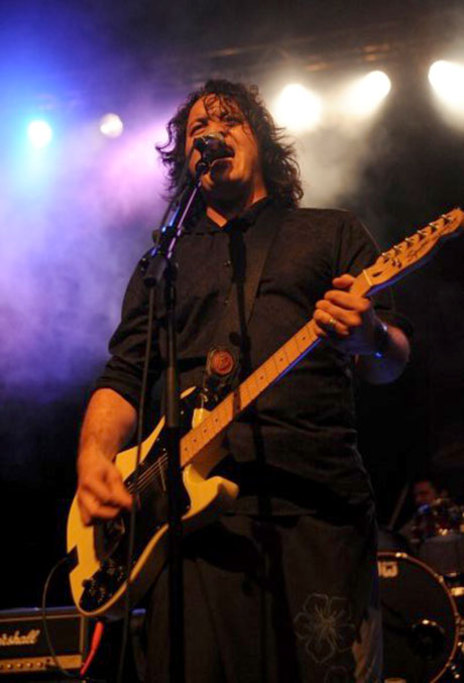
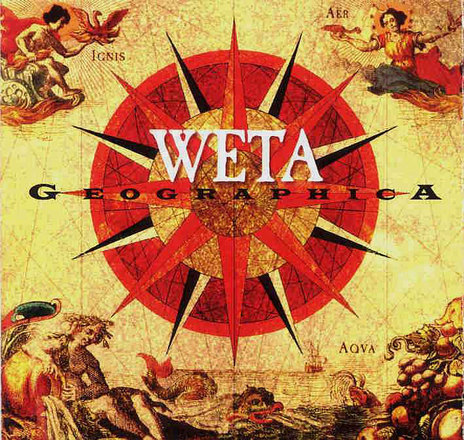
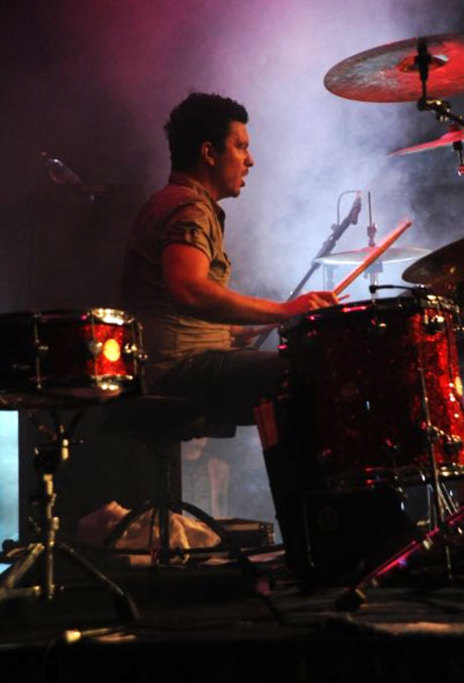
Shihad frontman Jon Toogood wrote the song Pacifier about Aaron Tokona.
Calling On serves as the opening music for the film When Strangers Appear.
Geographica producer Steve James is the son of English comedian Sid James.
Gabriel Atkinson - vocals, guitar
Clinton Tokona - bass
Clinton den Heyer - drums
NZ Herald's Russell Baillie reviews Geographica, 2000
Weta's Geographica is remastered on its 20th anniversary, 2021
Stuff, Feb 19, 2021: How a NZ rock classic was made: 'I had a week of panic attacks'
Warner Music
Visit our sister site
NZ On ScreenMade with funding from
NZ On Air